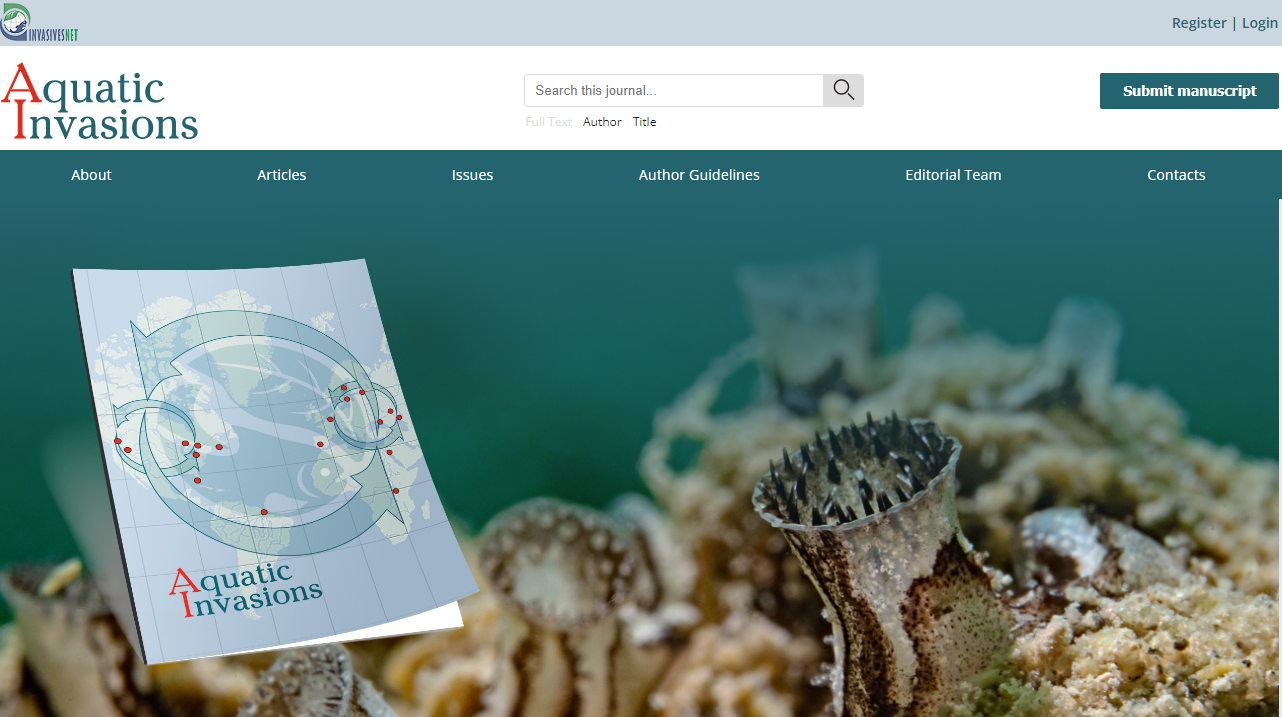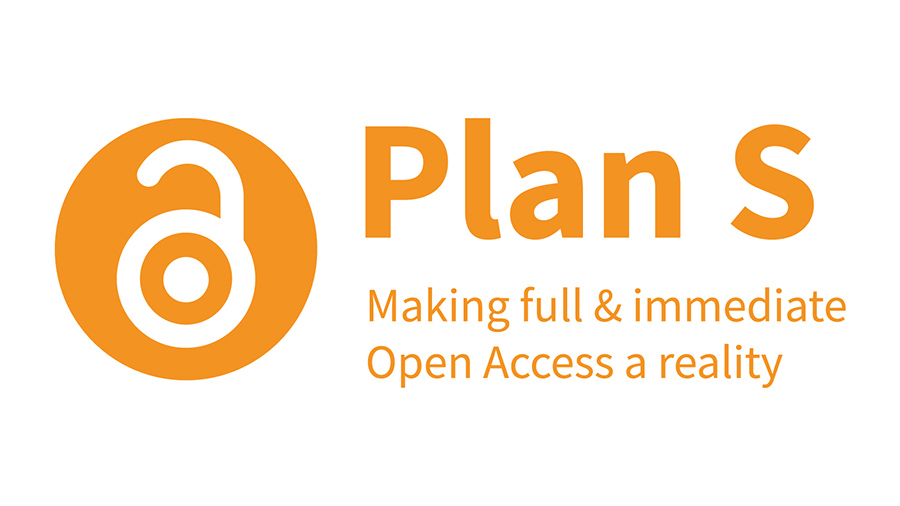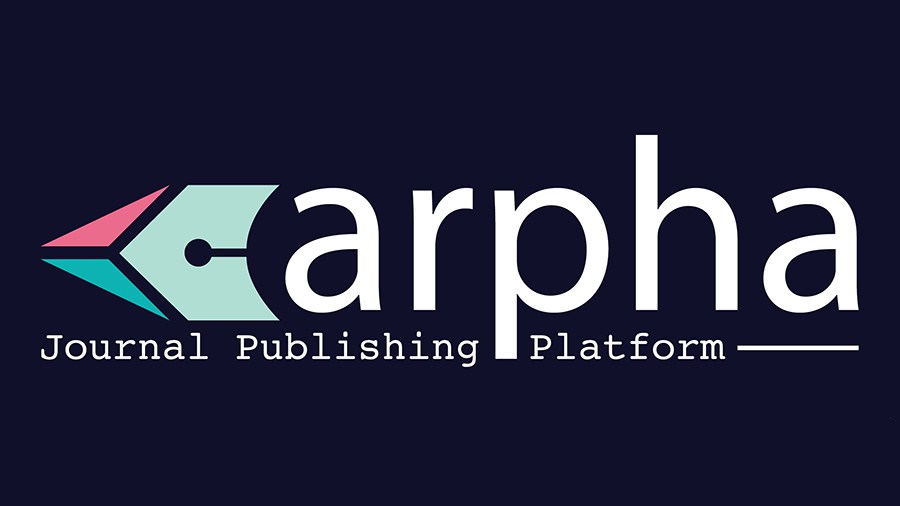Aquatic Invasions is an open-access, peer-reviewed journal on the biological invasions in inland and coastal water ecosystems from around the world launched by the International Association for Open Knowledge on Invasive Alien Species (INVASIVESNET) & the Regional Euro-Asian Biological Invasions Centre (REABIC).
The journal was established in 2006 as an initiative of the International Society of Limnology (SIL) Working Group on Aquatic Invasive Species (WGAIS) with start-up funding from the European Commission Sixth Framework Programme for Research and Technological Development Integrated Project ALARM to address the need for a dedicated platform to address the challenges of aquatic invasive species.
Aquatic Invasions has been gradually building on its appeal within the field of aquatic invasive species research, as its impact has been on the rise. Its latest Scopus CiteScore stands at 4.3 and its Journal Impact Factor is 2.651.
In early 2023, Aquatic Invasions moved to the ARPHA publishing platform to take advantage of its advanced tools and features, allowing the users to navigate throughout the website and enjoy the articles in either semantically enriched HTML or classic PDF format. ARPHA’s innovative and intuitive system streamlines the publication process, reducing the time and effort required to bring high-quality research to the scientific community.
In addition to providing a seamless publication experience, Aquatic Invasions will now benefit from enhanced visibility for its published articles. With advanced search capabilities and integration with major indexing services, including Web of Science, Scopus, and many others, articles published in Aquatic Invasions will be more easily discoverable and accessible to researchers around the world.
Furthermore, the implementation of the new article- and sub-article level metrics will enable real-time tracking of various elements, providing valuable insights into their usage.
Aquatic Invasions accepts papers related to the introduction, establishment, spread, and impacts of non-native aquatic species in freshwater, estuarine, and marine environments.
The journal also considers papers that provide new insights into the biology, ecology, and management of invasive species, as well as those that assess the ecological, economic, and social impacts of invasions.
«I am delighted to see Aquatic Invasions moving on to the ARPHA Platform. This will help the growth of our journal, facilitating the submission and production process.
Since its foundation, AI has been focused on biological invasions in aquatic environments, among the most vulnerable and threatened ecosystems by species introduction, to provide continuous updates for researchers but also stakeholders and managers, and promote the spread of its papers to all the sectors of society affected by this problem.
We want to improve our role in this sense, attracting more contributors and reaching more and more people, especially from that part of the world where the phenomenon and study of biological invasions in aquatic environments are increasing, such as Africa, Asia and South America. I am confident this new change will be positive for the journal!»
comments the Editor-in-Chief of the journal, Professor of University of Florence Dr Elena Tricarico.
«Aquatic Invasions was the first international fully open-access journal devoted to biological invasions. Currently, Aquatic Invasions, along its sister journals, BioInvasions Records and Management of Biological Invasions, is a core linking element of INVASIVESNET – the global professional Association of organisations and experts working in the area of biological invasions. Our strategic goal – to make our publication services free of charge for all authors in the long-term, and within INVASIVESNET, we are working on the development of the Open Access Publishing Fund and seeking for potential sponsors and other funding solutions.
Also, we are extremely optimistic that the movement of Aquatic Invasions to the ARPHA platform will improve our services for authors and facilitate free dissemination of data and knowledge on invasive species globally»,
comments the founder and Managing Editor of the journal, Director of REABIC, Dr Vadim Panov.
«We are thrilled to announce our partnership with another journal focused on the important topic of biological invasions here at Pensoft. With our extensive experience in publishing and disseminating research on zoology and biodiversity, I am confident that this journal has found a perfect home within the ARPHA journals family»,
comments Prof. Lyubomir Penev, CEO and founder of Pensoft and ARPHA.
The first papers of 2023 are already available online on the new website of Aquatic Invasions.
Among the seven articles published, there are four papers on marine and three papers on inland water invasions across 4 continents. The studies are covering non-native ascidians in southern California; invasive forams along the coasts of Normandy; invasive sun coral spreading along the Brazilian coasts; invasive pufferfish in the Eastern Mediterranean; invasive New Zeland mudsnail in the Greater Yellowstone Area (U.S.A.); Australian red-claw crayfish in Thailand and non-native species that invaded Poyang Lake Basin (China) after 2000.
***
Additional information
About INVASIVESNET:
The International Association for Open Knowledge on Invasive Alien Species (INVASIVESNET) is a global network of scientists and researchers who collaborate to improve knowledge sharing and management related to invasive alien species. INVASIVESNET is committed to promoting the use of open data and knowledge to advance research, management, and policy related to invasive alien species. The organization aims to facilitate the exchange of information and ideas among its members and other stakeholders to promote effective invasive alien species management strategies and enhance global biosecurity.
About REABIC:
The Regional Euro-Asian Biological Invasions Centre (REABIC) is an international organisation that focuses on research, management, and prevention of biological invasions, particularly in the Euro-Asian region. REABIC was established in 2003 and is based in Helsinki, Finland. The organisation brings together scientists, experts, and stakeholders from various fields to develop and implement strategies for preventing and managing the negative impacts of invasive species on biodiversity, ecosystems, and human well-being.
About ARPHA:
ARPHA is the first end-to-end, narrative- and data-integrated publishing solution that supports the full life cycle of a manuscript, from authoring to reviewing, publishing and dissemination. ARPHA provides accomplished and streamlined production workflows that can be customized according to the journal’s needs. The platform enables a variety of publishing models through a number of options for branding, production and revenue models to choose from.
About Pensoft:
Pensoft is an independent, open-access publisher and technology provider, best known for its biodiversity journals, including ZooKeys, Biodiversity Data Journal, Phytokeys, Mycokeys, One Ecosystem, Metabarcoding and Metagenomics and many others.
Over the past 30 years, Pensoft has built a reputation for its innovations in the field, after launching ZooKeys: the very first digital-first scientific journal in zoology and the first to introduce semantic enrichments and hyperlinks within a biodiversity article.
To date, the company has continuously been working on various tools and workflows designed to facilitate biodiversity data findability, accessibility, discoverability and interoperability. The latest large projects, led by Pensoft include the OpenBiodiv knowledge graph and the Horizon 2020 project BiCIKL.
Contacts:
Prof. Lyubomir Penev, founder and CEO at ARPHA and Pensoft
Email: l.penev@pensoft.net
Dr Elena Tricarico, Editor-in-Chief of Aquatic Invasions
Email: elena.tricarico@unifi.it
Dr Vadim Panov, Managing Editor of Aquatic Invasions and Director at REABIC
Email: vepanov@gmail.com



